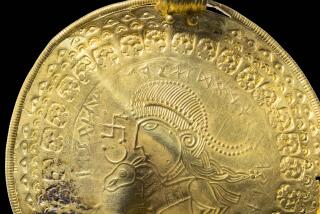Student’s Slaying Fills University With Rage
The death of a Shiite Muslim student activist last week has convulsed Baghdad University with a chain of protests, threats and recriminations, shutting down classes for several days.
Students have staged sometimes destructive demonstrations, demanding the expulsion of professors with ties to Iraq’s former Baathist regime and calling some of them out by name. Fearing for his life, the dean of the college of pharmacy left the country and vowed not to return.
“I can’t go back. I have to protect my life and the life of my children,” said Mustafa Hiti, who fled the school last Tuesday after protesters tried to break into his office. The Sunni Muslim dean, who was interviewed by telephone from an undisclosed location, said he planned to seek asylum in “any civilized country.”
Hiti became the focus of student rage after a Shiite pharmacy student named Masar Sarhan was killed by gunmen May 2, hours after holding an on-campus celebration to welcome the new government of Prime Minister Ibrahim Jafari, who is also a Shiite. During the party, Sarhan got into an argument with one of Hiti’s bodyguards, several students said.
Grief over Sarhan’s death turned to anger against Hiti, fueled by rumors of a threat against Sarhan by the bodyguard and by the fact that the dean hails from a town in western Iraq that has been a noted center of Baathist power.
“Anyone who benefited from the Saddam regime is a criminal and deserves what they get,” said Haidar Mahdi, a 21-year-old pharmacy student who described the unrest as a “student revolution against the Baath.”
“The college was like a room full of gas, and Masar’s death was the spark that ignited it,” he said.
Classes at the university’s Bab Muadham campus resumed Sunday for the first time in five days. But many professors have stayed away, fearing the wrath of the activist, Islamist student union, which some faculty members say is on a witch hunt.
The academic turmoil reflects a societywide debate over how to reconcile Iraq’s future with its Baathist past. At its heart is an almost metaphysical question of what constitutes a “real Baathist,” as opposed to those who joined the party in order to survive and work.
“We were all Baathists. We needed to live,” said Abu Adil, a grizzled university watchman.
His guard shack overlooks the spot where dozens of angry students stood last week, some dangling belts in their hands, demanding that mass communications dean Hamida Smaysam be brought out to them.
“They were banging on the doors requesting Dr. Hamida,” Abu Adil said.
Smaysam has yet to return to the university, where the buildings are covered with printed banners expressing sentiments such as “Baathist professors mean a backward society” and “We demand the expulsion of all Baathists from the field of education.” Alongside hang numerous red banners hailing Jafari’s new government, which is dominated by Shiites and ethnic Kurds.
It was the celebration of Jafari’s ascension that most students and teachers believe ignited the current firestorm.
Despite contradictory accounts of the events preceding Sarhan’s death, few doubt that he was killed because of his active role as a member of the prime minister’s Islamic Dawa Party.
On May 2, Sarhan helped organize the pro-Jafari celebration. At one point, an altercation developed between Sarhan and a man with a pistol who was seen mingling in the crowd. The man at first refused to give his name, but was eventually identified as one of Hiti’s bodyguards.
At this point, the accounts diverge. Members of the student union say the man threatened Sarhan, while Hiti says several students brought the guard to his office, where the issue was peacefully resolved. Hiti says he sided with the students and chastised the guard for not cooperating.
In any case, the dispute cut short the celebrations. Later that night, Sarhan was shot a few blocks from his home in the Baghdad district of Saydiya.
Hiti said he wept for Sarhan, with whom he had a “personal and psychological relationship,” and canceled classes when he heard the news. A crowd of mourning students gathered last Tuesday in front of the pharmacy school, joined by students from other colleges. The mood soon turned unruly, with students shouting anti-Baath slogans, then forcing their way into the building and breaking windows.
Hiti fled as protesters attempted to reach his office. Police were brought in as the crowd moved on to other buildings, and several Sunni professors had to be escorted to safety. More peaceful student protests continued in the following days as the administration canceled several days of classes.
The conflict reflects the ethnic fault lines of modern-day Iraq. Whereas Shiites and Kurds dominate the new government, the former ruling Sunni minority mostly stayed away from the polls in January’s election, either in protest or for fear of attack. Their ranks are believed to fuel the country’s deadly insurgency.
Hiti is from the town of Hit in Al Anbar province, a Sunni stronghold known for producing Baath loyalists.
But some other professors accused of having Baathist sympathies are Shiite, as are some of Hiti’s strongest defenders.
“He was the best dean the pharmacy college has ever had,” said Haidar Chassib, a Shiite former student.
Student union leaders say they plan no more protests for the time being. “Our message has been received,” said one arts and sciences student, who asked that his name not be used.
They admit that the first day’s demonstration was out of control and that it’s possible innocent professors with little or no connection to the Baathists were targeted.
They also concede that there is no evidence connecting Hiti or his bodyguard to Sarhan’s death, and say Sarhan had also received threats from within his neighborhood because of his political activism.
Hiti has asked for an extended leave of absence, and has since been replaced as dean of the pharmacy college.
More to Read
Start your day right
Sign up for Essential California for news, features and recommendations from the L.A. Times and beyond in your inbox six days a week.
You may occasionally receive promotional content from the Los Angeles Times.





